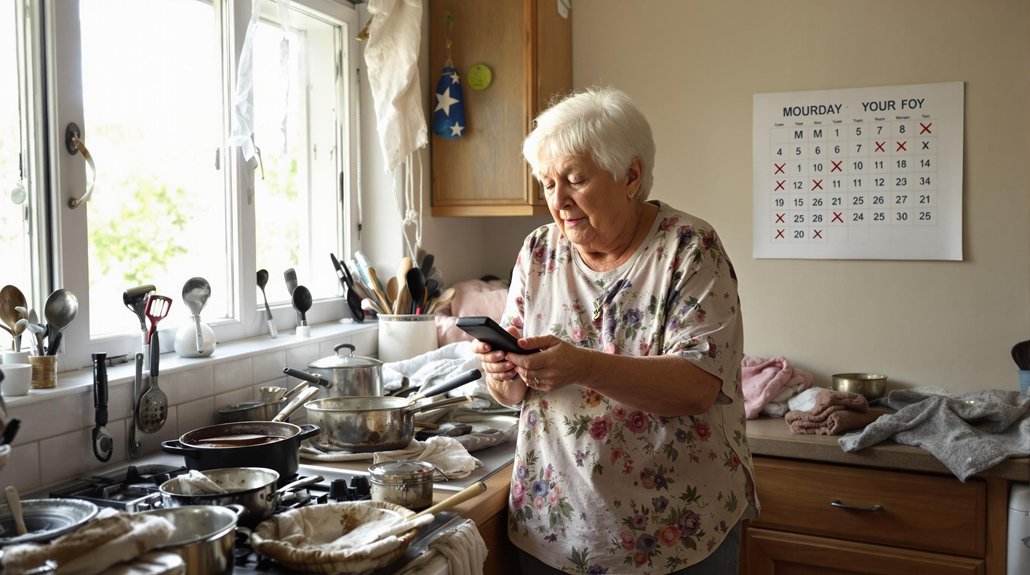Medicare offers limited coverage for home care services if you have dementia, but specific requirements must be met. You’ll need a doctor to certify that you’re homebound and require skilled nursing care or therapy. While Medicare won’t cover 24/7 or personal care services, it does pay for medical supplies, equipment, and various therapies. Medicare Advantage plans and supplemental options can provide additional coverage to help fill important care gaps.
Understanding Medicare’s Basic Coverage for Dementia Care
While managing Medicare coverage for dementia care can seem overwhelming, understanding the basics will help you make informed decisions about your loved one’s care.
Medicare Part A and Part B provide foundational coverage for individuals with a dementia diagnosis. Your loved one must meet Medicare eligibility requirements, which include being 65 or older or having certain disabilities.
Part A covers inpatient hospital stays, skilled nursing facilities, and some home health services when medically necessary. Part B helps with outpatient care, medical supplies, and preventive services.
You’ll want to verify that your loved one’s healthcare providers accept Medicare assignment to minimize out-of-pocket costs.
Remember that Original Medicare doesn’t cover long-term custodial care, but it does cover short-term care needs related to treating and managing dementia symptoms.
Many families opt for respite care services to provide temporary relief when Medicare coverage limits are reached.
Types of Home Care Services Medicare Will Cover
When your loved one needs home care services, Medicare will cover several specific types of skilled care as long as they’re deemed medically necessary and prescribed by a doctor.
Covered home health services include intermittent skilled nursing care, physical therapy, occupational therapy, and speech-language pathology services.
Medicare-covered home health care provides essential medical services through skilled nursing, physical therapy, occupational therapy, and speech therapy programs.
Medicare will also cover necessary medical supplies and durable medical equipment used in the home.
However, it’s important to understand that Medicare doesn’t cover 24-hour home care or personal care services like bathing, dressing, or using the bathroom when that’s the only care needed.
You’ll need to be prepared to either provide these personal care services yourself or explore other payment options, such as long-term care insurance or Medicaid, to cover these essential non-medical services.
Medical social services can help connect seniors and their families with additional resources and provide emotional support during care transitions.
Medicare Coverage Limitations and Restrictions
Medicare’s home care coverage comes with specific requirements and restrictions you need to understand. Coverage eligibility depends on your loved one’s specific medical condition and care needs. You’ll find several service limitations that can affect the care your family member receives.
Key coverage restrictions include:
- Your loved one must be homebound, meaning they can’t leave home without considerable difficulty.
- A doctor must certify that skilled nursing care or therapy is medically necessary.
- Care must be part-time or intermittent, not 24/7 continuous care.
Understanding these limitations helps you plan appropriate care for your family member with dementia.
When Medicare coverage falls short, you might need to explore additional resources or alternative care options to guarantee your loved one receives extensive support.
Working with agencies that provide specialized dementia care can help ensure comprehensive support through trained caregivers who understand memory care challenges.
Alternative Medicare Plans and Supplemental Options
Since traditional Medicare has significant coverage gaps for dementia care, you’ll want to explore several alternative plans and supplemental insurance options.
Medicare Advantage plans often provide expanded coverage for home care services, adult day care, and respite care that original Medicare doesn’t cover. These plans may also include prescription drug coverage and care coordination services.
You can also consider Medicare Supplemental Insurance (Medigap) policies to help cover copayments, deductibles, and other out-of-pocket expenses.
Some Medigap plans offer additional benefits specifically designed for dementia patients, such as coverage for skilled nursing care beyond Medicare’s limits.
Personalized care plans through providers like Sunshine Health Coverage ensure comprehensive support including medication management, mobility assistance, and daily living help.
Navigating the Medicare Approval Process for Home Care
To secure Medicare coverage for home care services, you’ll need to navigate a structured approval process that requires specific documentation and medical certifications.
Understanding Medicare eligibility requirements and completing a thorough home care assessment are essential first steps in getting approval for your loved one with dementia.
- Schedule an appointment with your loved one’s doctor, who must certify that they’re homebound and require skilled nursing care or therapy services.
- Document all symptoms, daily challenges, and care needs to help establish the medical necessity for home care during the assessment.
- Work with a Medicare-approved home health agency to develop a detailed care plan that meets both Medicare’s requirements and your loved one’s specific needs.
Remember to maintain detailed records throughout the process, as you may need them for periodic reviews of continued coverage.
Medicaid home health care may provide an additional cost-effective option for families needing financial assistance with home-based care services.
Bridging the Coverage Gaps: Additional Resources and Support
While Medicare provides essential coverage for home care services, it often doesn’t cover all the support that dementia patients need.
You’ll need to explore additional funding sources and support systems to guarantee thorough care for your loved one.
Look into community resources like your local Area Agency on Aging, which can connect you with financial assistance programs, respite care services, and support groups.
Many non-profit organizations offer grants specifically for dementia care, and some states provide supplemental programs to help cover care costs.
Don’t overlook support groups for caregivers, which can provide valuable information about local resources and emotional support.
Consider reaching out to organizations like the Alzheimer’s Association, which offers 24/7 helplines, educational resources, and guidance on accessing financial assistance programs in your area.
Conclusion
Medicare can help cover home care for dementia patients, but it’s important to know what’s covered and what isn’t. Think of it like building a safety net – you might need several pieces to make it strong. Just like Mary, who got the care her father needed by combining regular Medicare with other services, you too can find the right mix of support.
You don’t have to figure this out by yourself. There are caring people who understand what you’re going through and can help you create a plan that works for your family. Whether it’s getting help with daily tasks, finding adult day care, or arranging for someone to give family caregivers a much-needed break, there are options available.
Remember, taking care of a loved one with dementia is a journey, and you deserve support along the way. Your family isn’t alone in this – there are people and resources ready to help you create the best care plan possible.
If you or a loved one need help, don’t wait. Reach out to Focus Family Care today at (561) 693-1311 or email us at info@focusfamilycare.com.





